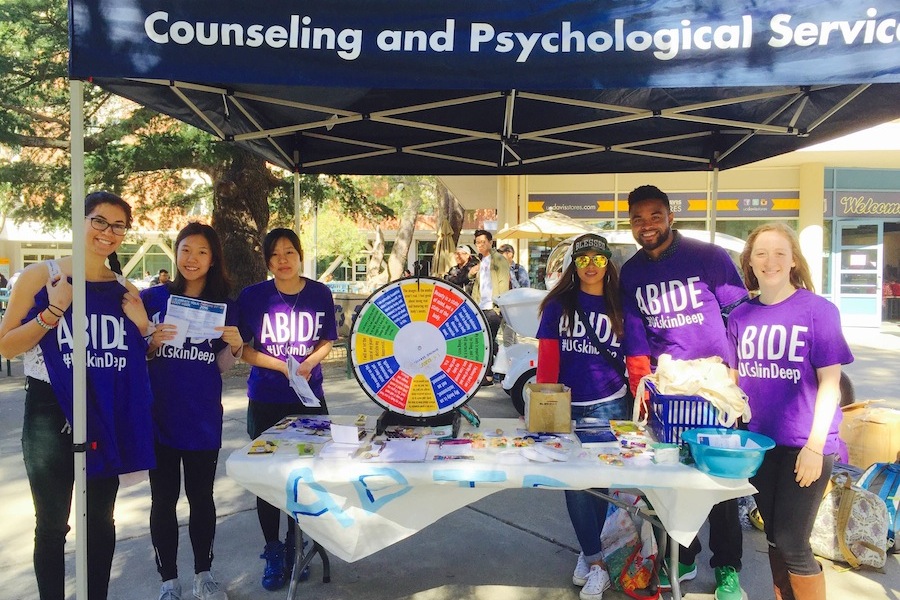
UC Davis clubs and services promote a healthy relationship with food and body image.
Issues with body image and eating disorders can act as silent threats on college campuses. To combat this, certain UC Davis clubs and services provide resources that can help students see that their worth extends far beyond a number on a scale.
The Association For Body Image and Disordered Eating (ABIDE) is one campus organization that uproots the topic of body-shaming by promoting “self-love.”
“[ABIDE] promotes body [positivity] events on campus. We try to provide resources for students and provide safe places for them,” said Enya Meng, a fourth-year clinical nutrition major and ABIDE president. “We have discussions at meetings about body image, and we provide support to people that might not even know they need support.”
The club hosts quarterly events, starting with Fall Quarter’s “The Myth of the Freshman 15,” in which a nutritional speaker talks about the stigma of freshmen gaining weight. This year, the club held “Celebrate Your Body Week” with a “Public Display of Acceptance” on the Quad, where students stood in white shirts as peers wrote body affirmations on the shirts.
Spring Quarter’s event was “The Great Jeans Giveaway.” Students had the chance to donate a pair of jeans to Women Escaping a Violent Environment (WEAVE) from May 11 to 20, as a means of celebrating their biological genes.
“A big focus is celebrating yourself, and we are a really inclusive group,” said Allie Fafard, second-year sustainable agriculture and food systems major and ABIDE public events coordinator. “The media really forces us to shape to this one person — ‘the thin ideal’ is the way we describe it, and that’s not realistic. We just want to encourage everyone to celebrate their own genetics.”
A new wave of support for body positivity is planned to hit campus next year through a movement known as “The Body Project.” This four-hour workshop is stopping by college campuses to train students to be peer-leaders, so that they can lead discussions on the media’s distortion of body types through monthly workshops open to students.
“[The Body Project Training] was just super eye-opening. As trainers, we weren’t really told what to expect,” Meng said. “When having these thought-provoking discussions, your perspective changes a bit because you’re sharing these moments with people you know or may not know.”
On its website, The Body Project is described as “cognitive-dissonance-based body acceptance intervention” that aims to help young women and girls resist societal pressures to conform to “the thin-ideal.” Although the campaign focuses on female-specific body image struggles, this is not to say the topic is nonexistent for men.
According to the National Eating Disorders Association (NEDA), 20 million women and 10 million men suffer from clinically significant eating disorders at some point throughout their lifetime. This includes commonly mentioned disorders such as anorexia nervosa, bulimia nervosa and binge eating.
More direct services are available through the Student Health and Wellness Center’s Eating Disorder Services, as well as other groups like UC Davis’ Active Minds that serve to give students support in a way that is most comfortable for them.
“We’re one of the UCs [that] offer the most services on campus — we have individual [short-term] sessions, but the training specialist can work long term, up to one or two years,” said Katie Cougevan, psychologist and coordinator of the Eating Disorder Program. “We also have specialists in the community that we can refer directly, and several groups that people could be apart of for the length that they are a student.”
These include Yoga for Recovery, an Art Recovery group and Nourish, which is a talk therapy group for recovering individuals.
“These are free services and you have the opportunity now in your life to approach this in a completely confidential manner with someone who’s going to take care of your needs for whatever’s going on,” Cougevan said. “Even if you feel nervous about it, you can take a small-step approach, and these counselors are all really nice people and we’re going to be welcoming and encouraging.”
If you or a loved one is experiencing dietary or body image struggles, appointments are available online at https://shcs.ucdavis.edu/services/eating-disorder.
Written by: Austin Carroll — features@theaggie.org



